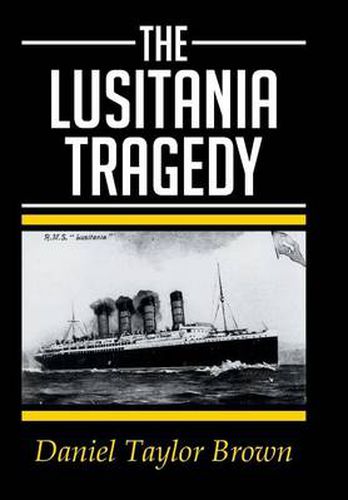Readings Newsletter
Become a Readings Member to make your shopping experience even easier.
Sign in or sign up for free!
You’re not far away from qualifying for FREE standard shipping within Australia
You’ve qualified for FREE standard shipping within Australia
The cart is loading…






This title is printed to order. This book may have been self-published. If so, we cannot guarantee the quality of the content. In the main most books will have gone through the editing process however some may not. We therefore suggest that you be aware of this before ordering this book. If in doubt check either the author or publisher’s details as we are unable to accept any returns unless they are faulty. Please contact us if you have any questions.
The RMS Lusitania passenger liner was torpedoed by a German U-boat and sank 11 miles off the coast of Ireland on May 7, 1915. 1,198 civilian lives were lost and 761 lived. Some survivors never told their stories but others in various ways spoke of their experiences.
Daniel Taylor Brown was one of those who survived and openly spoke out. He boldly chronicles his story and the accounts of some who also lived, but continues to tell of others who helplessly died during the attack and aftermath.
The reader cannot help but be transported to that time and place of great terror, loss and heroism. You will not only hear of a man’s will to live and escape a rapidly sinking ship against extreme odds, but with many souls still on board he watched the doomed Lusitania sink. It goes on with the stabbing pain and helplessness of witnessing those in the water die. The overwhelming trauma continued for all in the life boats while they persevered defenselessly as a sea of death surrounded them. With passion Daniel Brown relates this shocking story to us.
In 1916 after his return to his residence at the National Soldiers Home in Southern California, Mr. Brown was invited to speak publically. His story is presented here with a style of writing that conveys not only his heart of grief for all who suffered and died, but of an accountability for those who were the perpetrators.
$9.00 standard shipping within Australia
FREE standard shipping within Australia for orders over $100.00
Express & International shipping calculated at checkout
This title is printed to order. This book may have been self-published. If so, we cannot guarantee the quality of the content. In the main most books will have gone through the editing process however some may not. We therefore suggest that you be aware of this before ordering this book. If in doubt check either the author or publisher’s details as we are unable to accept any returns unless they are faulty. Please contact us if you have any questions.
The RMS Lusitania passenger liner was torpedoed by a German U-boat and sank 11 miles off the coast of Ireland on May 7, 1915. 1,198 civilian lives were lost and 761 lived. Some survivors never told their stories but others in various ways spoke of their experiences.
Daniel Taylor Brown was one of those who survived and openly spoke out. He boldly chronicles his story and the accounts of some who also lived, but continues to tell of others who helplessly died during the attack and aftermath.
The reader cannot help but be transported to that time and place of great terror, loss and heroism. You will not only hear of a man’s will to live and escape a rapidly sinking ship against extreme odds, but with many souls still on board he watched the doomed Lusitania sink. It goes on with the stabbing pain and helplessness of witnessing those in the water die. The overwhelming trauma continued for all in the life boats while they persevered defenselessly as a sea of death surrounded them. With passion Daniel Brown relates this shocking story to us.
In 1916 after his return to his residence at the National Soldiers Home in Southern California, Mr. Brown was invited to speak publically. His story is presented here with a style of writing that conveys not only his heart of grief for all who suffered and died, but of an accountability for those who were the perpetrators.